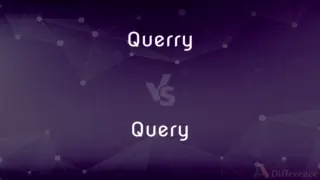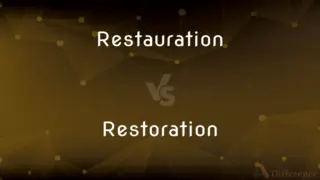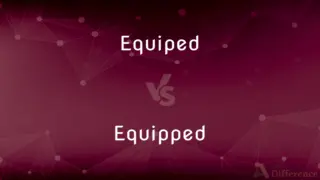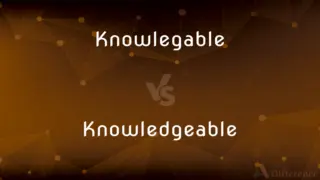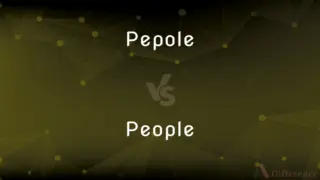Concide vs. Coincide — Which is Correct Spelling?
By Tayyaba Rehman — Updated on March 25, 2024
Concide is an incorrect spelling. The correct spelling is Coincide, meaning for two or more events or things to happen or exist at the same time.
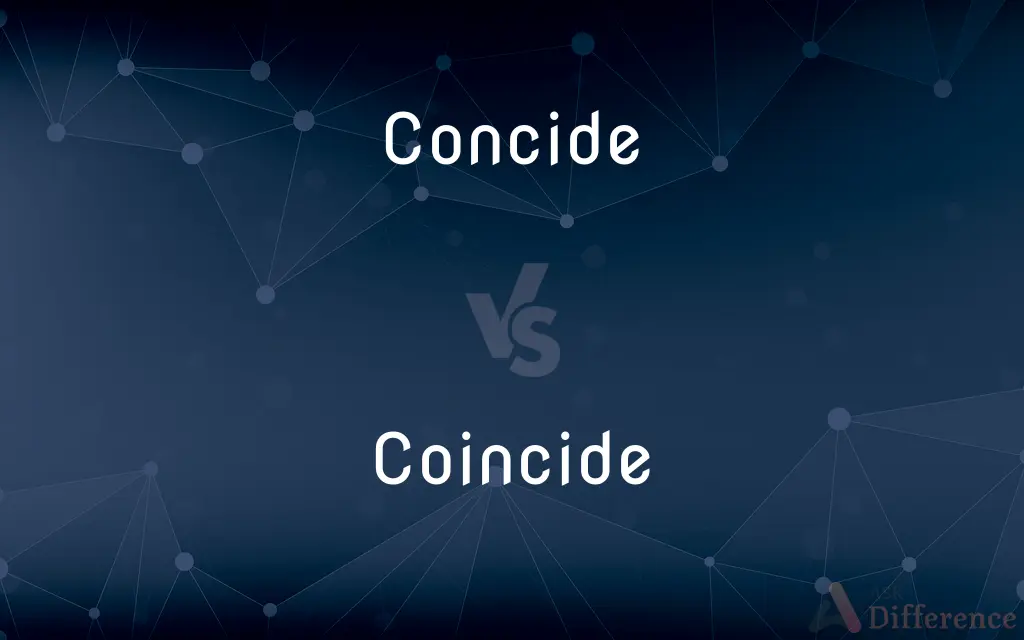
Table of Contents
Which is correct: Concide or Coincide
How to spell Coincide?

Concide
Incorrect Spelling

Coincide
Correct Spelling
ADVERTISEMENT
Key Differences
Think of "Coincide" as two things (Coin- two sides) occurring together.
"Coincide" begins with "Coin-" like in "coin" that we use as currency.
Visualize two overlapping circles; where they overlap, they "coincide."
Remember "incide" as in "incident" to recall the latter part.
Connect "Coincide" with "coexist" to remember things happening simultaneously.
ADVERTISEMENT
How Do You Spell Coincide Correctly?
Incorrect: The end of the fiscal year does not concide with the calendar year.
Correct: The end of the fiscal year does not coincide with the calendar year.
Incorrect: The two events will concide on the same day.
Correct: The two events will coincide on the same day.
Incorrect: It's unusual for such opinions to concide among different groups.
Correct: It's unusual for such opinions to coincide among different groups.
Incorrect: We plan to concide our efforts to improve efficiency.
Correct: We plan to coincide our efforts to improve efficiency.
Incorrect: Their interests rarely concide, making collaboration difficult.
Correct: Their interests rarely coincide, making collaboration difficult.
Coincide Definitions
To be in agreement or harmony.
Their views on the topic fortunately coincide.
For two lines or paths to meet or intersect.
The two roads coincide at the junction.
To occupy the same place in space or time.
The two meetings coincide, so I can attend only one.
To correspond in nature or character.
Her interests coincide with mine.
Occur at the same time
Publication is timed to coincide with a major exhibition
Correspond in nature; tally
The interests of employers and employees do not always coincide
To occupy the same relative position or the same area in space.
To happen at the same time or during the same period.
To correspond exactly; be identical.
To agree exactly, as in opinion; concur.
To occupy exactly the same space.
The two squares coincide nicely.
To occur at the same time.
The conference will coincide with his vacation.
To correspond, concur, or agree.
Our ideas coincide, except in certain areas.
To occupy the same place in space, as two equal triangles, when placed one on the other.
If the equator and the ecliptic had coincided, it would have rendered the annual revoluton of the earth useless.
To occur at the same time; to be contemporaneous; as, the fall of Granada coincided with the discovery of America.
To correspond exactly; to agree; to concur; as, our aims coincide.
The rules of right jugdment and of good ratiocination often coincide with each other.
Go with, fall together
Happen simultaneously;
The two events coincided
Be the same;
Our views on this matter coincided
To happen at the same time or place.
The rain started to pour just as the event began, making them coincide.
Coincide Meaning in a Sentence
Our ideas for the project coincide perfectly.
Their vacation plans coincide with the music festival in the city.
It's rare for our schedules to coincide like this.
The lunar eclipse will coincide with the spring equinox this year.
Their views on the subject surprisingly coincide.
Our breaks coincide, so let's have lunch together.
The parade will coincide with the city's anniversary celebrations.
The peak of the meteor shower will coincide with a new moon.
Their interests in science and art seldom coincide.
The interests of the two organizations rarely coincide.
Our study periods coincide, so we can help each other.
Coincide Idioms & Phrases
Make it coincide
To arrange for events or schedules to align.
We can try to make our breaks coincide so we can meet for lunch.
Coincide with reality
To match or align with the actual state of affairs.
Her optimistic view does not always coincide with reality.
Coincide with natural phenomena
To occur simultaneously with natural occurrences.
The blooming of these flowers coincides with natural phenomena that signal the start of spring.
Coincide in opinion
To share the same viewpoint or belief.
It's rare for the entire committee to coincide in opinion on such matters.
Coincide with historical events
To occur at the same time as significant historical moments.
The author's birth coincided with historical events that would shape his works.
Coincide with the times
To match or reflect the current trends or era.
His innovative designs coincide with the times, making them very popular.
Coincide by chance
To occur at the same time by accident, without being planned.
We coincided by chance at the coffee shop and decided to catch up.
Coincide with expectations
To meet or match what was anticipated.
The final product coincided with expectations, pleasing the client.
Coincide with someone's views
To agree with someone's opinions or beliefs.
It's refreshing to meet someone whose interests coincide with mine.
To not coincide
To not agree or match up with something.
Unfortunately, our vacation plans do not coincide this year.
Common Curiosities
What is the root word of Coincide?
Derived from Latin "coincidere."
What is the pronunciation of Coincide?
/kəʊˈɪn.saɪd/
Which vowel is used before Coincide?
Either "a" or "the" can precede "coincide," depending on the context.
Why is it called Coincide?
It comes from the Latin "coincidere", meaning "to agree, to be in harmony", from "co-" (together) + "incidere" (to fall upon).
What is the verb form of Coincide?
Coincide is the verb form.
Which preposition is used with Coincide?
"With" as in "coincide with."
What is the plural form of Coincide?
Not applicable; verbs don't have plural forms.
Which conjunction is used with Coincide?
Any conjunction can be used, depending on the sentence.
Which article is used with Coincide?
Both "a" and "the" can be used, based on context.
What is the singular form of Coincide?
Coincide (it's a verb and does not have a plural form in that sense).
Is Coincide a negative or positive word?
Neutral.
How many syllables are in Coincide?
Three.
What is a stressed syllable in Coincide?
The second syllable "in."
Is Coincide an abstract noun?
No.
Is Coincide a vowel or consonant?
It's a word, but it starts with a consonant.
Is Coincide a countable noun?
Coincide is not a noun; it's a verb.
Is the word Coincide a gerund?
"Coinciding" is the gerund form of "coincide."
What is the first form of Coincide?
Coincide.
Is Coincide a noun or adjective?
Verb.
Is the Coincide term a metaphor?
No, but it can be used metaphorically in some contexts.
Is the word Coincide imperative?
It can be used in the imperative mood, e.g., "Please ensure your schedules coincide."
What part of speech is Coincide?
Verb.
What is another term for Coincide?
Correspond.
Which determiner is used with Coincide?
"This" or "that" can be used, e.g., "this coincide moment."
What is the second form of Coincide?
Coincided.
How is Coincide used in a sentence?
The two events are expected to coincide, causing a busy day in the city.
Is Coincide a collective noun?
No.
Is the word “Coincide” a Direct object or an Indirect object?
It's a verb and can have a direct or indirect object depending on the sentence.
How do we divide Coincide into syllables?
Co-in-cide.
What is the opposite of Coincide?
Diverge.
What is the third form of Coincide?
Coincided.
Is Coincide an adverb?
No.
Share Your Discovery

Previous Comparison
Sucktion vs. Suction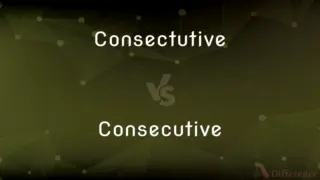
Next Comparison
Consectutive vs. ConsecutiveAuthor Spotlight
Written by
Tayyaba RehmanTayyaba Rehman is a distinguished writer, currently serving as a primary contributor to askdifference.com. As a researcher in semantics and etymology, Tayyaba's passion for the complexity of languages and their distinctions has found a perfect home on the platform. Tayyaba delves into the intricacies of language, distinguishing between commonly confused words and phrases, thereby providing clarity for readers worldwide.


